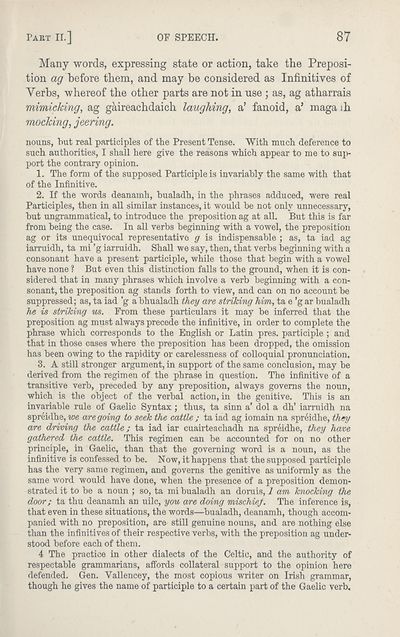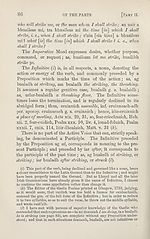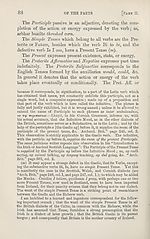Books and other items printed in Gaelic from 1871 to 1900 > Elements of Gaelic grammar
(107) Page 87
Download files
Complete book:
Individual page:
Thumbnail gallery: Grid view | List view

Part II.]
OF SPEECH.
87
Many words, expressing state or action, take the Preposi¬
tion ag before them, and may be considered as Infinitives of
Verbs, whereof the other parts are not in use ; as, ag atharrais
mimicking, ag gaireachdaich laughing, a’ fanoid, a’ magaih
mocking, jeering.
nouns, hut real participles of the Present Tense. With much deference to
such authorities, I shall here give the reasons which appear to me to sup¬
port the contrary opinion.
1. The form of the supposed Participle is invariably the same with that
of the Infinitive.
2. If the words deanamh, bualadh, in the phrases adduced, were real
Participles, then in all similar instances, it would be not only unnecessary,
but ungrammatical, to introduce the preposition ag at all. But this is far
from being the case. In all verbs beginning with a vowel, the preposition
ag or its unequivocal representative g is indispensable ; as, ta iad ag
iaiTuidh, ta mi ’g iarruidh. Shall we say, then, that verbs beginning with a
consonant have a present participle, while those that begin with a vowel
have none ? But even this distinction falls to the ground, when it is con¬
sidered that in many phrases which involve a verb beginning with a con¬
sonant, the preposition ag stands forth to view, and can on no account be
suppressed; as, ta iad 'g a bhualadh they are striking him, ta e ’g ar bualadh
he is striking us. From these particulars it may be inferred that the
preposition ag must always precede the infinitive, in order to complete the
phrase which corresponds to the English or Latin pres, participle ; and
that in those cases where the preposition has been dropped, the omission
has been owing to the rapidity or carelessness of colloquial pronunciation.
3. A still stronger argument, in support of the same conclusion, may be
derived from the regimen of the phrase in question. The infinitive of a
transitive verb, preceded by any preposition, always governs the noun,
which is the object of the verbal action, in the genitive. This is an
invariable rule of Gaelic Syntax ; thus, ta sinn a’ dol a dh’ iarruidh na
spreidhe, we are going to seek the cattle ; ta iad ag iomain na spreidhe, they
are driving the cattle; ta iad iar cuairteachadh na spreidhe, they have
gathered the cattle. This regimen can be accounted for on no other
principle, in Gaelic, than that the governing word is a noun, as the
infinitive is confessed to be. Now, it happens that the supposed participle
has the very same regimen, and governs the genitive as uniformly as the
same word would have done, when the presence of a preposition demon¬
strated it to be a noun ; so, ta mi bualadh an doruis, 1 am knocking the
door; ta thu deanamh an uilc, you are doing mischief. The inference is,
that even in these situations, the words—bualadh, deanamh, though accom¬
panied with no preposition, are still genuine nouns, and are nothing else
than the infinitives of their respective verbs, with the preposition ag under¬
stood before each of them.
4 The practice in other dialects of the Celtic, and the authority of
respectable grammarians, affords collateral support to the opinion here
defended. Gen. Vallencey, the most copious writer on Irish grammar,
though he gives the name of participle to a certain part of the Gaelic verb.
OF SPEECH.
87
Many words, expressing state or action, take the Preposi¬
tion ag before them, and may be considered as Infinitives of
Verbs, whereof the other parts are not in use ; as, ag atharrais
mimicking, ag gaireachdaich laughing, a’ fanoid, a’ magaih
mocking, jeering.
nouns, hut real participles of the Present Tense. With much deference to
such authorities, I shall here give the reasons which appear to me to sup¬
port the contrary opinion.
1. The form of the supposed Participle is invariably the same with that
of the Infinitive.
2. If the words deanamh, bualadh, in the phrases adduced, were real
Participles, then in all similar instances, it would be not only unnecessary,
but ungrammatical, to introduce the preposition ag at all. But this is far
from being the case. In all verbs beginning with a vowel, the preposition
ag or its unequivocal representative g is indispensable ; as, ta iad ag
iaiTuidh, ta mi ’g iarruidh. Shall we say, then, that verbs beginning with a
consonant have a present participle, while those that begin with a vowel
have none ? But even this distinction falls to the ground, when it is con¬
sidered that in many phrases which involve a verb beginning with a con¬
sonant, the preposition ag stands forth to view, and can on no account be
suppressed; as, ta iad 'g a bhualadh they are striking him, ta e ’g ar bualadh
he is striking us. From these particulars it may be inferred that the
preposition ag must always precede the infinitive, in order to complete the
phrase which corresponds to the English or Latin pres, participle ; and
that in those cases where the preposition has been dropped, the omission
has been owing to the rapidity or carelessness of colloquial pronunciation.
3. A still stronger argument, in support of the same conclusion, may be
derived from the regimen of the phrase in question. The infinitive of a
transitive verb, preceded by any preposition, always governs the noun,
which is the object of the verbal action, in the genitive. This is an
invariable rule of Gaelic Syntax ; thus, ta sinn a’ dol a dh’ iarruidh na
spreidhe, we are going to seek the cattle ; ta iad ag iomain na spreidhe, they
are driving the cattle; ta iad iar cuairteachadh na spreidhe, they have
gathered the cattle. This regimen can be accounted for on no other
principle, in Gaelic, than that the governing word is a noun, as the
infinitive is confessed to be. Now, it happens that the supposed participle
has the very same regimen, and governs the genitive as uniformly as the
same word would have done, when the presence of a preposition demon¬
strated it to be a noun ; so, ta mi bualadh an doruis, 1 am knocking the
door; ta thu deanamh an uilc, you are doing mischief. The inference is,
that even in these situations, the words—bualadh, deanamh, though accom¬
panied with no preposition, are still genuine nouns, and are nothing else
than the infinitives of their respective verbs, with the preposition ag under¬
stood before each of them.
4 The practice in other dialects of the Celtic, and the authority of
respectable grammarians, affords collateral support to the opinion here
defended. Gen. Vallencey, the most copious writer on Irish grammar,
though he gives the name of participle to a certain part of the Gaelic verb.
Set display mode to:
![]() Universal Viewer |
Universal Viewer | ![]() Mirador |
Large image | Transcription
Mirador |
Large image | Transcription
Images and transcriptions on this page, including medium image downloads, may be used under the Creative Commons Attribution 4.0 International Licence unless otherwise stated. ![]()
| Rare items in Gaelic > Books and other items printed in Gaelic from 1871 to 1900 > Elements of Gaelic grammar > (107) Page 87 |
|---|
| Permanent URL | https://digital.nls.uk/106560561 |
|---|
| Description | Out-of-copyright books printed in Gaelic between 1631 and 1900. Also some pamphlets and chapbooks. Includes poetry and songs, religious books such as catechisms and hymns, and different editions of the Bible and the Psalms. Also includes the second book ever published in Gaelic in 1631. |
|---|

